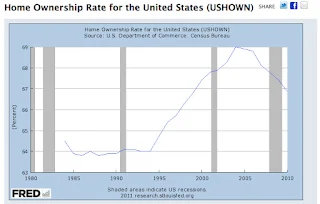The latest figures from the Federal Reserve (link: compare lines 4 and 42) show that enormous wealth destruction in housing is the overwhelming cause of the dramatic decline in household net worth between 2006 and 2011.
Of the $7.8 trillion decline in net worth over that period, $6.6 trillion of that is all from the bursting of the housing bubble . . . nearly 85 percent.
Hurt most by this are the millions of middle class Americans whose primary asset is their home. Desperately trying to hold on to what they have, by scrimping, saving and working, they don't have the luxury of time to occupy much of anything to protest what is happening to them.
It is impolitic to say so, but their plight is the frequent one of the undiversified investor: too many eggs in one basket.
But that's not a bug, it's a feature of entering the middle class, whose goal is owning a home and raising a family in it, not sophisticated money management and investing. Such people who can scrape together the income of $40,000 to $50,000 necessary to support home ownership typically aren't going to have significant financial assets to manage. Of the 150 million wage earners in America, after all, fully 99 million make $40,000 a year or less.
Neither Obama nor the Republican candidates for president, nor Occupy Wall Street or the Tea Party for that matter, seem to talk much about any of this, yet the collapse of housing better explains the growing gap between rich and poor in America than do the supposed crimes of the one percent. The rich may be getting richer, but it's inspite of the fact that their own homes have declined in value, too. The middle class is being squeezed downward because its primary asset continues to lose value.
The deep frustration of so many of the American people with their elected leaders is that the leaders really don't represent them in this matter, in the same sense that sympathizing with, understanding, or trying to fix this problem doesn't have the urgency for them anymore than it does for the rich. The reason is that virtually none of them has personal experience of it. From our president to our senators and all the way on down to our representatives, we have leaders whose own high net worth and the insulation from our vulnerabilities that that affords make them remote, unfeeling, and unmotivated.
In point of fact, since it was Democrats and Republicans who conspired in the very policies which have misled Americans to drain $10 trillion in home equity over three decades (for example, dramatic changes to tax and banking policy in 1997 and 1999 under Bill Clinton, Newt Gingrich and Phil Gramm), it shouldn't be surprising that none of them really wants to talk about this gorilla in the living room. They helped make and sell the bed we're now sleeping in. And we bought it.
Of about 132 million total dwellings in 2010 of all types (table 3), just 61 million occupied dwellings are single family homes occupied by their owners, with an additional 11 million occupied by renters, according to the latest Census data here (link). That means something substantially less than 46 percent of total dwellings in the country could plausibly represent the American dream of the traditional middle class. The richest quintile, those households making over $100,000 per year, let it be remembered, lives in houses, too.
The Economic Policy Institute, whose president is a socialist, here (link) provides a useful summary of how wealthier individuals avoided the severity of the housing decline precisely because more of their assets were diversified and were not all riding on real estate (emphases added):
In 2007—prior to the Great Recession—median net worth was $106,000 (consisting primarily of home equity, as discussed later). ... Net worth for the top 1% was $19.2 million in 2007 . . ..
The updated figures for 2009 reflect the enormous destruction of wealth due to the bursting of the housing bubble. As a general rule, households with less wealth have a greater share of their wealth embedded in their homes. Thus, it is not surprising that the fallout from the deflating housing bubble disproportionally affected them. On average, the top 20% lost 16.0% and the bottom 80% lost 25.1% of their total wealth in 2008 and 2009. Average wealth of the bottom 80% was just $62,900 in 2009—a dropoff of $40,900 from 2007 and slightly less, in inflation-adjusted terms, than it was more than a quarter-century ago in 1983. Those at the top also lost ground but not nearly as much, percentage-wise. Average wealth of the top 1% was close to $14 million in 2009, down $5.2 million from 2007. ...
[H]ousing equity is a far more important form of wealth for most households. ... In 2007, the middle 20% of households held $196,700 in non-stock assets, and only $10,200 in stocks. In other words, non-stock assets—which are over-whelmingly housing equity—made up about 95% of this group’s wealth.
In the United States homeownership has long been associated with solid footing on the economic ladder, and yet the housing crash has meant that for a broad swath of people homeownership is no longer a reality.
The stepping stone from the lower and working classes to the upper classes, obviously, is the middle class. Very few skip that step, on the way up or on the way down. Rags to riches and back to rags again is interesting, but not common. Rich liberals from both parties, however, have a vested interest in minimizing the middle class to polarize the country. Rich Republicans and Democrats alike don't want the competition entrepreneurial Americans threaten them with, and leftist Democrats need a servile, manipulable constituency they can feed table scraps to in order to keep themselves in power. Some so-called conservative Republicans also, it must be said, seek their own fiefdoms of influence and power at the expense of impulses to limited government. George W. Bush's play for senior votes with Medicare Part D comes to mind.
What middle Americans should demand is a bigger House of Representatives to co-opt these entrenched interests by de-concentrating the power which the 435 now enjoy. Tea Partiers in particular should be advocating a return to the constitutional principle of one representative for every thirty-thousand of population, if their protestations to originalism mean anything. Instead of the bloated, rich and corrupt 435 politicians we've been stuck with for a hundred years, we should have 10,000 lean citizen legislators.
When we get them, things will begin to change for the better because our representatives will have far less power and far more reason to listen to the people. Special interests will have much less influence over them, campaigns will be far less costly, and Congressional staffs could be reduced dramatically, saving us money and getting some actual work out of our politicians for a change. The move would also take away the enthusiasm for radical proposals such as the elimination of the electoral college by dramatically expanding the pool of electors in presidential elections.
We might even persuade such a House to overturn the 17th Amendment, another blow for originalism, which would help improve the US Senate almost overnight. By returning the corrupting influences of campaign cash to state houses where senators would be appointed, we might actually be able to do something about corruption more often because it would be closer to home and we'd be more aware of it.









































